Ever wondered why my cat can’t meow just squeaks to communicate?
While many cats communicate with a recognizable “meow,” you might have noticed that your furry friend produces a softer squeak instead.
It’s a peculiarity that can leave you scratching your head: why does your cat not meow like the rest?
Well, as with all things cats, the answer weaves through a tapestry of behavior, biology, and evolution, including the unique behaviors of stray and feral cats.
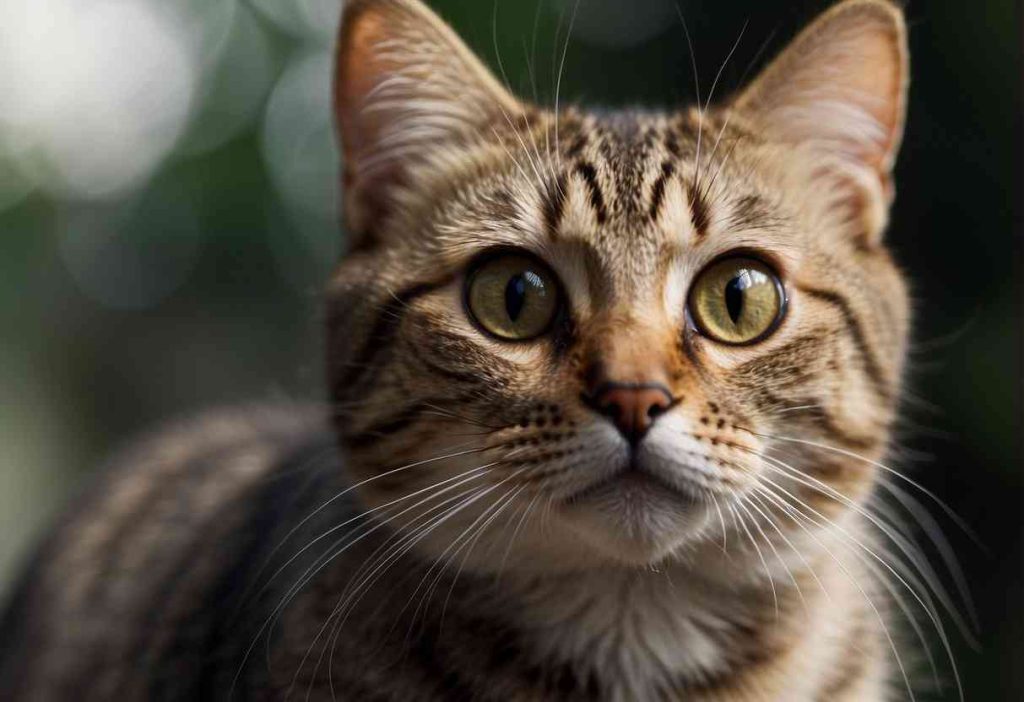
Vocalizations in cats, including meowing and soft squeaking, are their way of reaching out to us, expressing needs, desires, or even complaints. (1)
Meowing is a habit developed primarily for human communication, often used as a greeting or a means of soliciting attention or food. (2)
On the other side of the coin, a soft squeak or chitter might be your adult cat’s default—a throwback to the sounds they’d make as kittens or a trait picked up from a quiet mother cat.
If your cat’s soft squeak or chitter has replaced a once robust meow, it could signal a health issue, such as coughing, and a vet visit might be in order. (3)
Understanding the nuances of your cat’s squeaks can be both intriguing and essential for their well-being. As part of the family, it’s only natural to want to crack the code of what each little squeak might mean.
And for those new to the cat parenting game, deciphering these sounds is part of the adventure of getting to know your companion.
Key Takeaways
- Cats use various vocalizations, and while meowing is common some only squeak.
- A squeak can be a kitten-like trait or indicate a quieter feline upbringing.
- Sudden changes from meowing to squeaking warrant a check-up with a veterinarian.
Health Concerns Related to Cat Squeaking
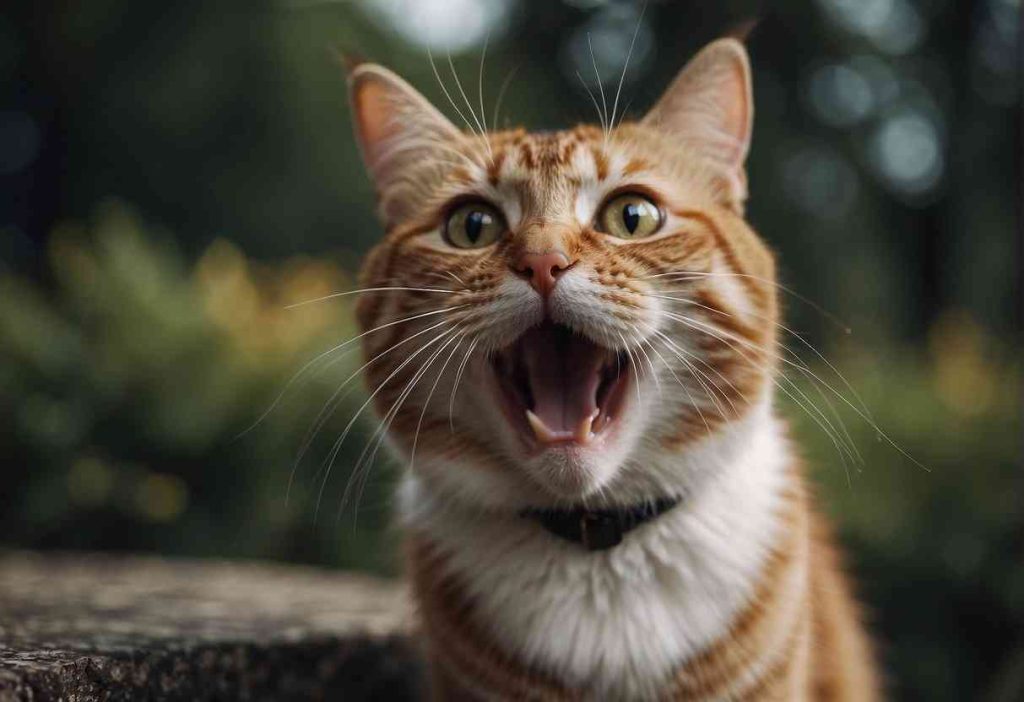
Identifying Potential Health Issues:
- Laryngitis: Your cat’s voice box might be inflamed, leading to a hoarse sound or squeak. (4)
- Respiratory Infections: A cold or upper respiratory infection can mess with your kitty’s meow. (5)
- Vocal Cord Damage: Just like a singer after a heavy concert, vocal cord damage can turn meows into squeaks. (6)
Be on the lookout for symptoms such as:
- Reduced appetite
- Lethargy: Is your usually active cat slowing down? (7)
- Changes in breathing: Perhaps you’ve noticed a wheeze or rapid breaths?
When to Seek Veterinary Care: Did you know that cats are masters of disguise? Especially when it comes to hiding pain or discomfort.
But if Fluffy’s squeaks have become the norm or you’re noticing concurrent symptoms, such as signs of pain, it’s time to visit the vet for medical attention.
Persistent squeaking and behavioral changes are your cue to seek professional advice and potentially receive treatment.
As a diuretic to reduce the buildup of fluid in the larynx or a mild painkiller to help your cat feel better.
Feeling uncertain? Remember, regular check-ups are the secret ingredient to keeping your whiskered companion happy and healthy. Catching potential issues early on is better for everyone.
So, if your gut tells you something’s off with your cat’s vocals, trust that instinct.
Have you observed these signs in your cat? Keep an eye on your furry friend and maintain those vet visits. Your cat’s squeak could be saying more than you think!
Decoding the Squeak: Why My Cat Can’t Meow Just Squeaks
Why Some Cats Squeak Instead of Meow:
- Genetics play a part; some cats are just born quieter. (8)
- Just like you picked up your accent, cats develop vocal habits from their environment. Lack of exposure to meowing might result in a squeak!
- Certain breeds, like the sweet Siamese, often have a distinctive voice that’s more of a delicate squeak than a meow.
You might think a cat’s vocabulary is limited, but that’s like saying a smartphone only makes calls. Cats have quite the lexicon!
The Range of Cat Vocalizations:
- Purring: that gentle rumble when they’re happy or healing. (9)
- Hissing: watch out, that’s kitty for “back off!”
- Chirping: yes, they can chirp! It’s usually a “hello” to birds or a “look at that!” to you.
- Trills and chirrups: when they’re excited or saying a friendly hello.
Each sound is a note in their language, expressing everything from contentment to annoyance.
And no, we haven’t installed audio clips here, but a quick internet search will treat your ears to the symphony of cat sounds.
So, next time your cat squeaks up, remember it’s their way of saying, “Hey, you’re my human, let’s chat.” Just not in so many words, because… well, they’re a cat!
Keep listening, and you’ll learn to speak fluent feline in no time.
Addressing Changes in Cat Vocalization
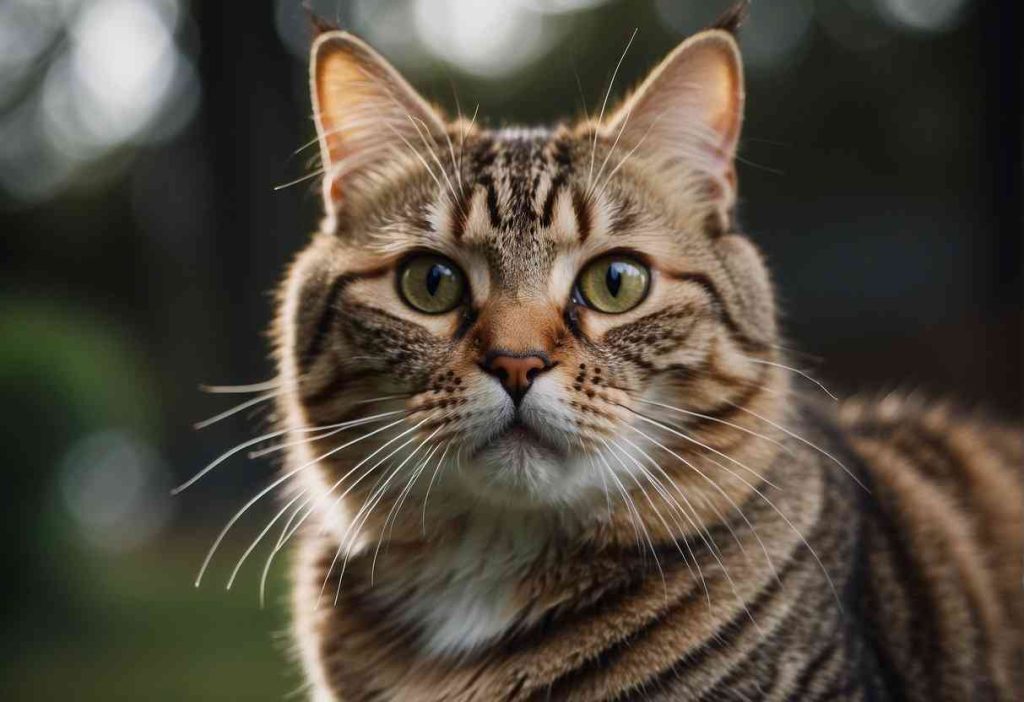
Adapting to Your Cat’s New Vocal Patterns Is your cat’s usual meow now a whisper or a squeak? Don’t worry, you’re both learning a new language of love!
Pay close attention to their body language and environment. Stressed kitty? Their squeaks might mean they need some extra TLC. Notice when the squeaks occur to decode their messages.
- Interactive Learning: Recognizing Different SoundsListening session: Pair squeaks with actions to guess your cat’s needs.
- Sound matching: Play a game matching squeaks to emotions or desires.
Strategies to Communicate
- Visual Cues: Identify and respond to non-vocal signals like tail flicks and ear positions.
- Consistent Routine: Less guesswork means less stress for both of you.
- Health Check: Rule out issues with a vet visit—it’s always good to be sure.
Remember, a change in vocalization doesn’t silence the love you share with your cat. It’s about finding new ways to understand each other. Embrace the squeaks, and together, you’ll keep the conversation going!
Cat Care and Communication Strategies
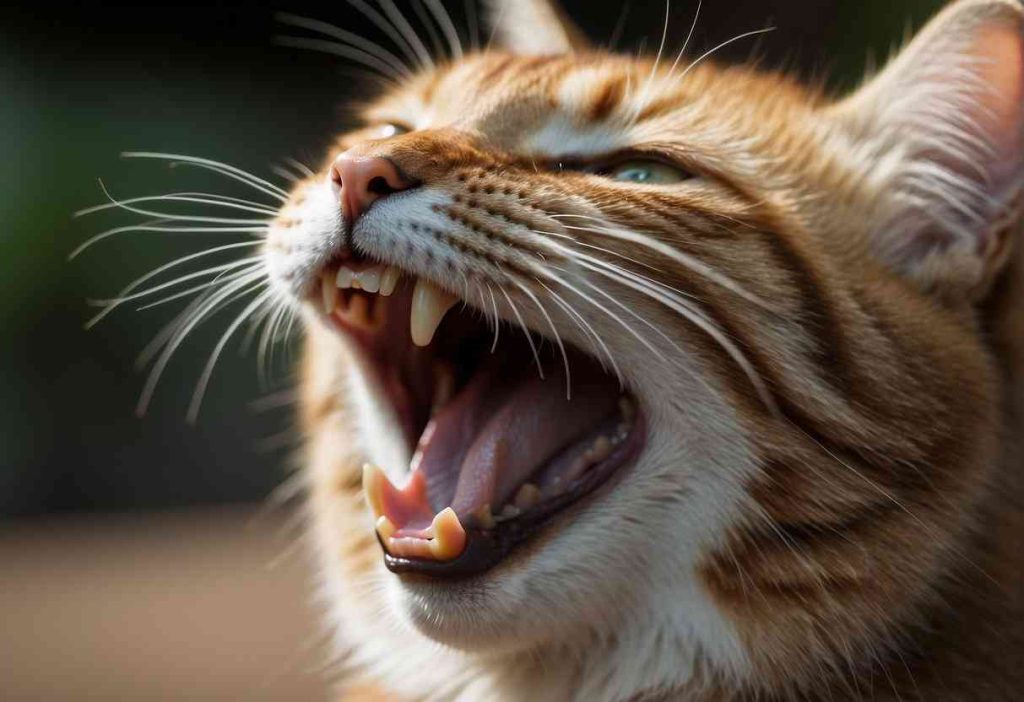
Responding to Your Cat’s Squeaks
Responding to your cat’s squeaks rather than a full-on meow involves tuning into their needs. Here’s how to handle this adorable quirk:
- Listen closely: Each squeak can vary in pitch and frequency, indicating different moods or requests.
- Observe their body language: A tail flick or perk of the ears can offer clues about what your silent companion is trying to say.
- Positive reinforcement: When your cat communicates and gets what they want, give them a treat. This can reinforce their efforts to ‘talk’ to you.
Fostering a Comfortable Environment
Creating a stress-free zone is vital for your kitty’s vocal health. Believe it or not, cats can be quite the stress-balls, and a relaxed environment might just help them find their voice.
Here are some surefire ways to help your cat chill out:
- Safe Spaces: Provide plenty of comfy hiding spots with soft bedding for a quick retreat.
- Toy Variety: Keep playtime fresh with a mix of toys to prevent boredom – think lasers, feathers, and catnip galore!
- Consistency matters: A regular schedule for feeding, play, and snuggles can greatly reduce anxiety.
Remember, while their squeaks are cute, it’s important to rule out any potential health issues. If you’re ever in doubt, a check-up with the vet can give you peace of mind. Happy chatting with your squeaky companion!
Special Considerations for First-Time Cat Owners
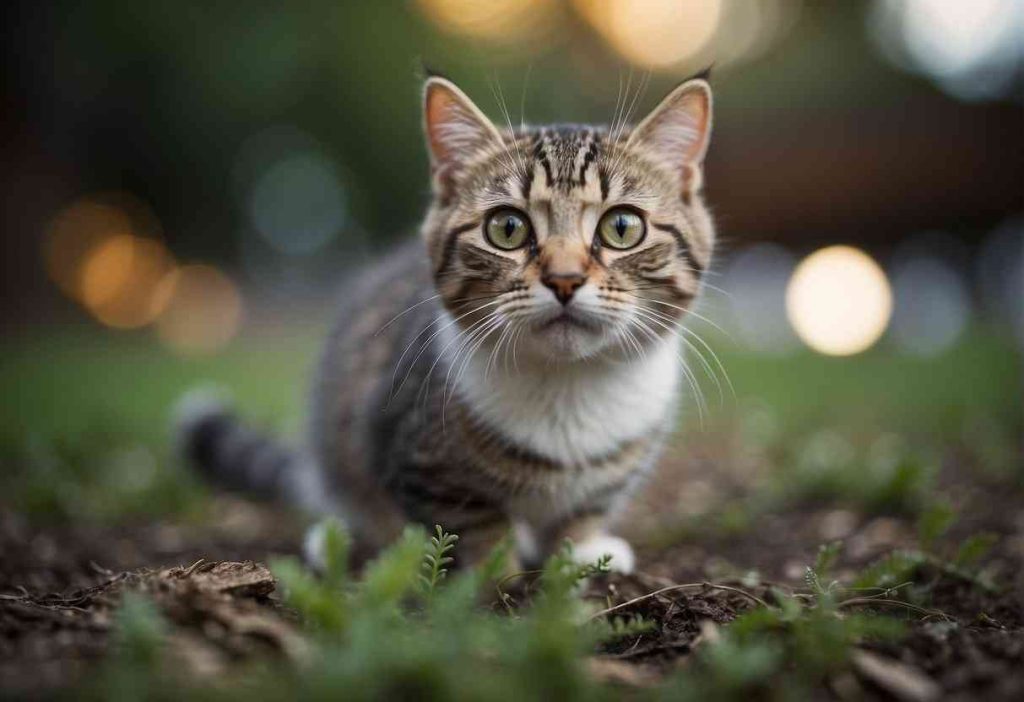
Basic Guide to Cat Sounds
Here’s a quick rundown:
- Meow: The classic cat hello! But, different meows can mean different things.
- Purr: Contentment, or sometimes it can be a sign of pain. Context matters!
- Hiss or Spit: Back off, buddy!
- Squeak: Often found in kittens or a soft reminder from your cat saying, “Hey, I’m here.”
Common Mistakes:
- Assuming a quiet cat is unhappy, which isn’t always the case.
- Misinterpreting a meow. Hunger? Loneliness? It’s a bit of a guessing game.
Encouraging Healthy Vocalizations
Want to chat more with your cat? Try these tips:
- Interact daily: Talk to your cat and wait for a response, even if it’s just a squeak.
- Pay attention: Notice when your cat squeaks. Is it when they see birds or during cuddles?
- Provide a stress-free home: A relaxed cat is more likely to vocalize.
Here’s a simple walkthrough, remember:
- Observe your cat’s sounds and body language.
- Respond and engage—their sounds are part of your bonding!
- Avoid loud noises or punishments that can lead to silence.
A few conversations with your whiskered pal, and you’ll be speaking fluent ‘cat’ in no time! Keep these tips in mind, and you’ll create a soundscape at home that both you and your cat can enjoy. Happy chatting!
Quick Recap
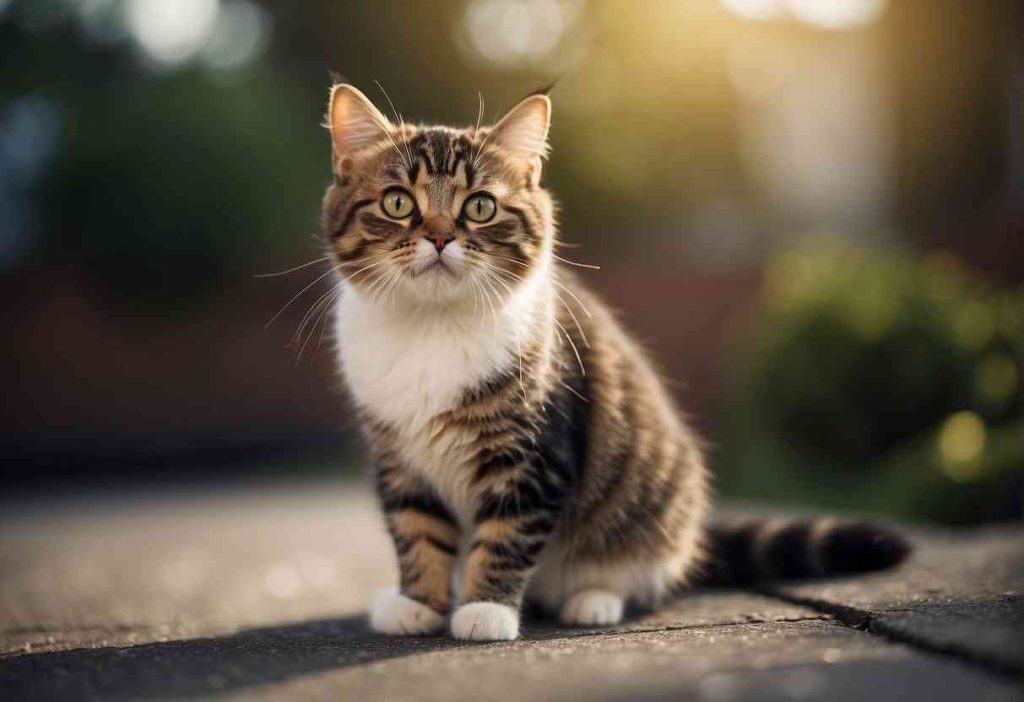
Let’s uncover this feline mystery together.
- Anxiety: Just like us, cats can feel anxious, and it can affect their voice.
- Discomfort or Pain: Squeaky sounds could be a sign your cat is hurting.
- Unique Trait: Some cats naturally have quieter voices—each kitty is unique!
Remember that vocal changes are a form of communication, and observing your cat’s sounds can help you tune in to their needs and feelings.
Not every cat’s throat and vocal cords are designed for a “meow” that can be heard around the world.
Some may have a squeak as distinctive as their purr, which can be caused by various conditions such as throat obstructions and inflammation, indicating a potential health problem.
However, it is important to note that some cats may choose not to meow at all, and may only vocalize if they are left alone for a long time.
If your cat is experiencing changes in their vocalizations, including a blockage in their throat, it is important to consult with a veterinarian to rule out any underlying health conditions affecting their larynx.
Celebrating the Diversity in Cat Communication
It’s a small, squeaky world after all in the land of feline chatter. Let’s celebrate our cats’ vocal stylings, from the tiniest squeak to the mightiest meow!
Understanding and appreciating these nuances can deepen the bond you share with your whiskered companion. Every “squeak” is a conversation starter!
Isn’t it just purr-fect to have a kitty conversing in their special way? Keep those ears perked and listen closely to the symphony of squeaks. It’s a sound that resonates with the unique joy that only a cat lover knows.
Frequently Asked Questions
If your feline friend has swapped its usual meow for a squeak, you’re likely full of questions. Let’s address some common queries about this curious behavior.
What could be the reason my cat has lost its meow and only squeaks now?
Several factors might cause your cat’s meow to turn into a squeak.
It could range from simply learning this mode of communication.
Particularly if they were feral or not around other meowing cats, due to potential medical issues affecting their vocal cords.
My cat’s meow sounds strained and it’s squeaking instead, should I be concerned?
A noticeable change in your cat’s voice, like a strained meow or a switch to squeaking, could be a sign of throat irritation or more serious health conditions.
Observe if there are other symptoms and consult your vet.
What should I do if my cat suddenly stops meowing and only produces soft squeaking noises?
If you notice a sudden change in your cat’s typical sounds, it’s always wise to err on the side of caution.
Contact your vet to rule out any health issues, as it may be an early sign of discomfort or illness.
Can a cat’s inability to meow and only squeak be a sign of a medical issue?
Absolutely. While some cats naturally squeak more than they meow.
A cat that has lost its ability to meow could be experiencing medical problems such as respiratory issues, infections, or even trauma to the voice box.
Why might a cat that used to meow normally start to meow silently or with a faint squeak?
A previously vocal cat shifting to silent meows or faint squeaks might be aging, have a sore throat, or could be under stress.
However, it’s also possible that they have a more severe health concern that needs veterinary attention.


